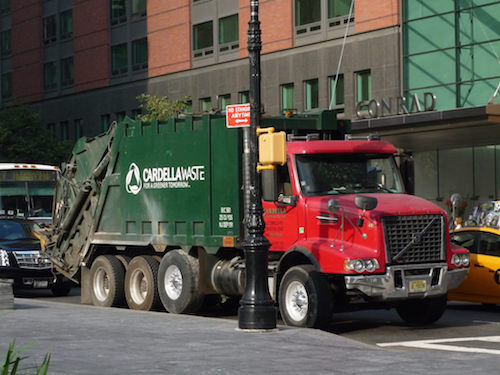A new waste management proposal has created a strong rift between the city and the companies that provide the services.
The city’s Department of Sanitation (DOS) introduced the plan the mayor’s office drew harsh criticism from those involved in the process, saying it will hurt small business and do more harm than good. But the city says the plan is not finished yet, but they stand by the idea of what they are doing.
Currently, in New York City, garbage is collected in two ways. Trash collected from residents and from public institutions is done by the city, with the DOS sending their own trucks to collect the waste.
As for trash from commercial businesses, that is in the hands of private businesses.
New York has always operated on the commercial side with an open market system, according to Kendall Christiansen, from the New Yorkers for Responsible Waste management.
“There is a direct business-to-business relationship between a business, a store and office building, and who they choose as their service providers,” Christiansen said.
Carters, as they’re historically called, provide a full range of waste and recycling services to commercial businesses, and those relationships are important to those who work in the industry.
“For the last 20 years, it’s been a very competitive and efficient open market system,” he said.
Christiansen said this is essential for the continued success of the industry. He said the city is currently considering a switch to a system that has trucks assigned to areas instead of allowing business owners to choose.
Others in the private sector of the industry tend to agree with Christiansen. Nelson Eusebio, from the National Supermarket Association, said changing to a system with more regulations would lead to higher prices.
“The system works well right now. If it’s not broken, don’t fix it. The multi-hauler zoned proposal is an attempt to do just this – fix a system that is not broken – and it’s going to be a nightmare that bears similar problems to the ones we see in LA [Los Angeles] like a spike in pricing and a decrease in customer service, leaving businesses with little to no recourse to address these problems,” Eusebio said.
The city is building upon its first proposal which would create geographic zones in which one truck would be assigned per zone. The city would give the company a ten-year contract to service the area.
Under the new proposal, the city would still be divided into geographic zones. But under this plan, there would be multiple trucks per zone.
“It’s an interesting idea,” he said, “It preserves some level of choice and competition, which is what the business community has asked to maintain.”
According to Christiansen, there is no way to access this plan because it has never been done before.
“There is no other city that has figured out how to do that kind of thing,” he said.
Christiansen said this suggestion has raised many questions about how the program would work, such as how the trucks would be assigned and how the businesses would be chosen.

At a press conference about reforming the city’s commercial waste industry, City Council Member Antonio Reynoso (D-Williamsburg, Bushwick), chair of the council’s Sanitation Committee, said that the plans of the zoning are still in the early stages of development.
“It’s only in the discussion,” he said, “We would like to ask the commissioner to reexamine nonexclusive zones.”
Reynoso said he admits that the non-exclusive zones were not popular amongst anyone and that it does need to be visited, but he emphasized that there is still a lot of work to do in the area.
“The commercial waste franchising effort is in its’s embryonic stages of development,” he said, “It is not finalized, it is not set in stone.”
The mayor’s office differed to the DOS for a statement since the plans have not been released yet.
DOS Spokesperson Dina Montes said that the zoning plan will drastically improve safety within the commercial collection industry.
“A commercial waste zone plan will provide inherent safety benefits to pedestrians, the public, and workers. With fewer trucks on the streets and shorter routes, zoned collection will also mean less unsafe driving behavior and worker fatigue, and improved traffic and air quality,” Montes said.
According to Montes, by reducing the number of trucks in a single neighborhood on a nightly basis, the city’s studies show truck traffic will be reduced by as much as 60% in these areas without sacrificing the quality.
“It will also be safer, fairer, and more sustainable than the chaotic system that reigns today,” she said.
Similar to Reynoso’s comments, the plan is still in the stages of development and will be released later.
“We are working closely with stakeholders to implement zoned collection, and we’ll be releasing details of that plan this summer,” Montes said.










